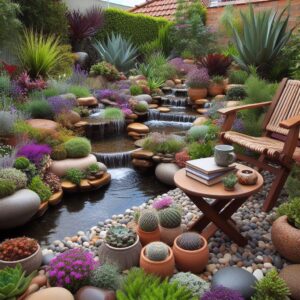In today’s environmentally conscious world, more and more individuals are turning to sustainable practices, even in their gardens. Creating a sustainable garden not only benefits the environment but also promotes a healthier and more harmonious ecosystem. One crucial aspect of cultivating a sustainable garden is making eco-friendly plant choices. In this article, we’ll explore the importance of sustainable gardening and provide insights into selecting plants that contribute to a greener and more eco-conscious outdoor space.
Why Sustainable Gardening Matters:
- Conserving Resources: Sustainable gardening focuses on conserving resources such as water, energy, and soil. Opting for plants that are well-adapted to the local climate reduces the need for excessive watering and minimizes the use of artificial fertilizers.
- Biodiversity Preservation: Sustainable gardens prioritize biodiversity, promoting the coexistence of various plant species and encouraging a healthier ecosystem. This approach attracts beneficial insects, birds, and other wildlife, creating a balanced and resilient garden environment.
- Reducing Chemical Usage: Traditional gardening often involves the use of chemical pesticides and fertilizers. Sustainable gardening seeks alternatives to these harmful substances, choosing plants that are naturally resistant to pests and diseases, thus reducing the need for synthetic chemicals.
Eco-Friendly Plant Choices:
- Native Plants: Opt for native plants that are naturally adapted to the local climate and soil conditions. Native plants require less maintenance, as they have evolved to thrive in specific regions. This reduces the need for artificial inputs and fosters a self-sustaining ecosystem.
- Perennials: Choose perennial plants that come back year after year, reducing the need for replanting. Perennials also contribute to soil health by preventing erosion and promoting long-term sustainability.
- Drought-Tolerant Varieties: Select plants that are well-suited to your region’s water availability. Drought-tolerant varieties require less water, helping you conserve this precious resource while still enjoying a lush and vibrant garden.
- Companion Planting: Embrace companion planting techniques by selecting plants that benefit each other when grown together. This natural approach to pest control and nutrient sharing enhances the overall health of your garden without the need for chemical interventions.
- Edible Landscaping: Incorporate edible plants into your garden design. Growing fruits, vegetables, and herbs not only provides a sustainable source of fresh produce but also adds aesthetic appeal to your garden.
Conclusion:
In conclusion, creating a sustainable garden through eco-friendly plant choices is a rewarding and responsible approach to gardening. By prioritizing resource conservation, biodiversity, and natural solutions, you contribute to a healthier environment and a more resilient outdoor space. Make informed choices, embrace sustainable practices, and enjoy the long-term benefits of a green and eco-conscious garden.



